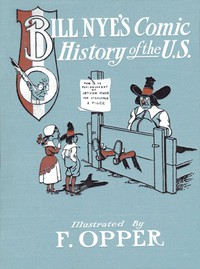Comic History of the United States by Bill Nye (book series for 10 year olds txt) 📗

- Author: Bill Nye
Book online «Comic History of the United States by Bill Nye (book series for 10 year olds txt) 📗». Author Bill Nye
Burgoyne now felt blue and unhappy. Besides, his troops were covered with wood-ticks and had had no washing done for three weeks.
He moved southward and attacked Gates at Bemis Heights, or, as a British wit had it, "gave Gates ajar," near Saratoga. A wavering fight occupied the day, and then both armies turned in and fortified for two weeks. Burgoyne saw that he was running out of food, and so was first to open fire.
Arnold, who had been deprived of his command since the last battle, probably to prevent his wiping out the entire enemy and getting promoted, was so maddened by the conflict that he dashed in before Gates could put him in the guard-house, and at the head of his old command, and without authority or hat, led the attack. Gates did not dare to come where Arnold was, to order him back, for it was a very warm place where Arnold was at the time. The enemy was thus driven to camp.
Arnold was shot in the same leg that was wounded at Quebec; so he was borne back to the extreme rear, where he found Gates eating a doughnut and speaking disrespectfully of Arnold.
A council was now held in Burgoyne's tent, and on the question of renewing the fight stood[Pg 176] six to six, when an eighteen-pound hot shot went through the tent, knocking a stylographic pen out of General Burgoyne's hand. Almost at once he decided to surrender, and the entire army of six thousand men was surrendered, together with arms, portable bath-tubs, and leather hat-boxes. The Americans marched into their camp to the tune of Yankee Doodle, which is one of the most impudent compositions ever composed.
KNOCKING A STYLOGRAPHIC PEN OUT OF BURGOYNE'S HAND.
During the Valley Forge winter (1777-78) Continental currency depreciated in value so that an officer's pay would not buy his clothes. Many, having also spent their private funds for the prosecution of the war, were obliged to resign and hire out in the lumber woods in order to get food for their families. Troops had no blankets,[Pg 177] and straw was not to be had. It was extremely sad; but there was no wavering. Officers were approached by the enemy with from one hundred to one thousand pounds if they would accept and use their influence to effect a reconciliation; but, with blazing eye and unfaltering attitude, each stated that he was not for sale, and returned to his frozen mud-hole to rest and dream of food and freedom.
Those were the untitled nobility from whom we sprung. Let us look over our personal record and see if we are living lives that are worthy of such heroic sires.
Five minutes will now be given the reader to make a careful examination of his personal record.
In the spring the joyful news came across the sea that, through the efforts of Benjamin Franklin, France had acknowledged the independence of the United States, and a fleet was on the way to assist the struggling troops.
The battle of Monmouth occurred June 28. Clinton succeeded Howe, and, alarmed by the news of the French fleet, the government ordered Clinton to concentrate his troops near New York, where there were better facilities for getting home.
Washington followed the enemy across New Jersey, overtaking them at Monmouth. Lee was[Pg 178] in command, and got his men tangled in a swamp where the mosquitoes were quite plenty, and, losing courage, ordered a retreat.
Washington arrived at that moment, and bitterly upbraided Lee. He used the Flanders method of upbraiding, it is said, and Lee could not stand it. He started towards the enemy in preference to being there with Washington, who was still rebuking him. The fight was renewed, and all day long they fought. When night came, Clinton took his troops with him and went away where they could be by themselves.
An effort was made to get up a fight between the French fleet and the English at Newport for the championship, but a severe storm came up and prevented it.
In July the Wyoming Massacre, under the management of the Tories and Indians, commanded by Butler, took place in that beautiful valley near Wilkes Barre, Pennsylvania.
This massacre did more to make the Indians and Tories unpopular in this country than any other act of the war. The men were away in the army, and the women, children, and old men alone were left to the vengeance of the two varieties of savage. The Indians had never had gospel privileges, but the Tories had. Otherwise they resembled each other.
In 1779 the English seemed to have Georgia[Pg 179] and the South pretty well to themselves. Prevost, the English general, made an attack on Charleston, but, learning that Lincoln was after him, decided that, as he had a telegram to meet a personal friend at Savannah, he would go there. In September, Lincoln, assisted by the French under D'Estaing, attacked Savannah. One thousand lives were lost, and D'Estaing showed the white feather to advantage. Count Pulaski lost his life in this fight. He was a brave Polish patriot, and his body was buried in the Savannah River.
The capture of Stony Point about this time by "Mad Anthony Wayne" was one of the most brilliant battles of the war.
THE ONLY THING WAYNE WAS AFRAID OF.
[Pg 180]
Learning the countersign from a negro who sold strawberries to the British, the troops passed the guard over the bridge that covered the marsh, and, gagging the worthy inside guard, they marched up the hill with fixed bayonets and fixed the enemy to the number of six hundred.
The countersign was, "The fort is won," and so it was, in less time than it takes to ejaculate the word "scat!" Wayne was wounded at the outset, but was carried up the hill in command, with a bandage tied about his head. He was a brave man, and never knew in battle what fear was. Yet, strange to say, a bat in his bed would make him start up and turn pale.[Pg 181]
CHAPTER XVIII. THE CLOSE OF THE REVOLUTION.The atrocities introduced into this country by the Tories and Indians caused General Sullivan to go out against the measly enemy, whip him near Elmira, and destroy the fields of corn and villages in the Genesee country, where the Indian women were engaged in farming while their men-folks attended to the massacre industry.
GENERAL GATES'S PROPER CAREER.
The weak point with the Americans seemed to be lack of a suitable navy. A navy costs money, and the Colonists were poor. In 1775 they fitted out several swift sailing-vessels, which did good service. Inside of five years they captured over five hundred ships, cruised among the British isles, and it is reported that they captured war-vessels that were tied to the English wharves.
[Pg 182]
Paul Jones had a method of running his vessel alongside the enemy's, lashing the two together, and then having it out with the crew, generally winning in a canter. His idea in lashing the two ships together was to have one good ship to ride home on. Generally it was the one he captured, while his own, which was rotten, was allowed to go down. This was especially the case in the fight between the Richard and the Serapis, September 23, 1779.
In 1780 the war was renewed in South Carolina. Charleston, after a forty days' siege, was forced to surrender. Gates now took charge of the South, and also gave a sprinting exhibition at Camden, where he was almost wiped off the face of the earth. He had only two troops left at the close of the battle, and they could not keep up with Gates in the retreat. This battle and the retreat overheated Gates and sowed the seeds of heart-disease, from which he never recovered. He should have chosen a more peaceful life, such as the hen-traffic, or the growth of asparagus for the market.
Benedict Arnold has been severely reproached in history, but he was a brave soldier, and possibly serving under Gates, who jealously kept him in the background, had a good deal to do with the little European dicker which so darkened his brilliant career as a soldier.[Pg 183]
ARNOLD'S RECEPTION IN ENGLAND.
Unhappy man! He was not well received in England, and, though a brilliant man, was forced to sit in a corner evening after evening and hear the English tell his humorous stories as their own.
The Carolinas were full of Tories, and opposition to English rule was practically abandoned in the South for the time, with the exception of that made in a desultory swamp-warfare by the partisan bands with such leaders as Marion, Sumter, and Pickens.
Two hundred thousand dollars of Continental money was the sum now out. Forty dollars of it would buy one dollar's worth of groceries; but the grocer had to know the customer pretty well, and even then it was more to accommodate than anything else that he sold at that price.
The British flooded the country with a counterfeit that was rather better-looking than the genuine: so that by the time a man had paid six[Pg 184] hundred dollars for a pair of boots, and the crooked bills had been picked out and others substituted, it made him feel that starting a republic was a mighty unpopular job.
General Arnold had married a Tory lady, and lived in Philadelphia while recovering from his wounds received at Quebec and Saratoga. He was rather a high roller, and ran behind, so that it is estimated that his bills there per month required a peach-basket-full of currency with which to pay them, as the currency was then quoted. Besides, Gates had worried him, and made him think that patriotism was mostly politics. He was also overbearing, and the people of Philadelphia mobbed him once. He was reprimanded gently by Washington, but Arnold was haughty and yet humiliated. He got command of West Point, a very important place indeed, and then arranged with Clinton to swap it for six thousand three hundred and fifteen pounds and a colonelcy in the English army.
Major André was appointed to confer with Arnold, and got off the ship Vulture to make his way to the appointed place, but it was daylight by that time, and the Vulture, having been fired on, dropped down the river. André now saw no way for him but to get back to New York; but at Tarrytown he was met by three patriots, who caught his horse by the reins, and, though André[Pg 185] tried to tip them, he did not succeed. They found papers on his person, among them a copy of Punch, which made them suspicious that he was not an American, and so he was tried and hanged as a spy. This was one of the saddest features of the American Revolution, and should teach us to be careful how we go about in an enemy's country, also to use great care in selecting and subscribing for papers.
In 1781, Greene, who succeeded Gates, took charge of the two thousand ragged and bony troops. January 17 he was attacked at Cowpens by Tarleton. The militia fell back, and the English made a grand charge, supposing victory to be within reach. But the wily and foxy troops turned at thirty





Comments (0)